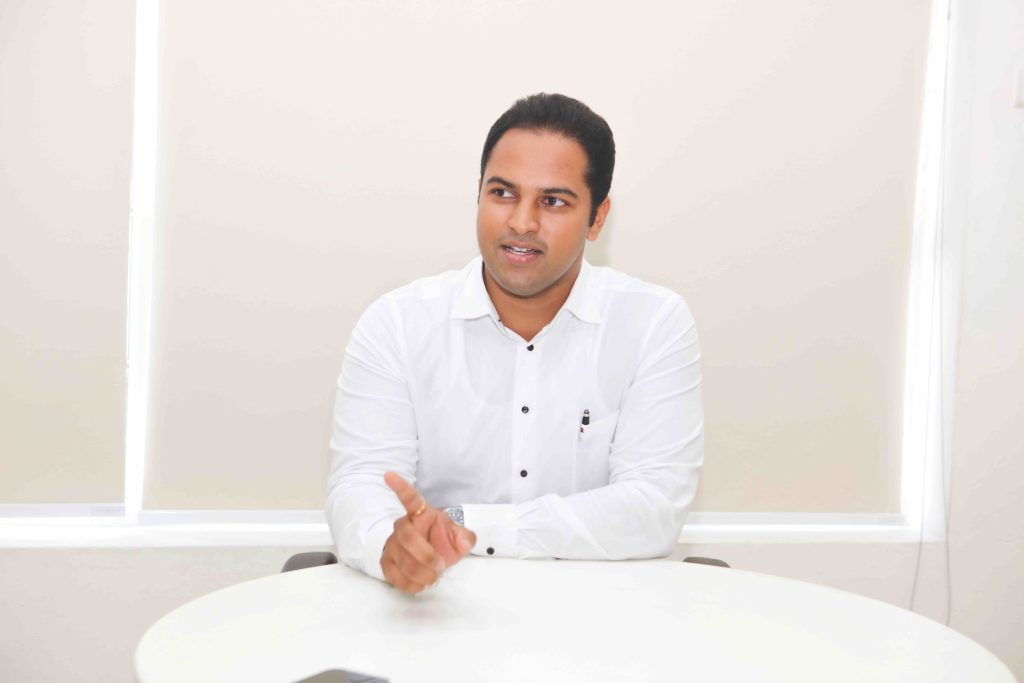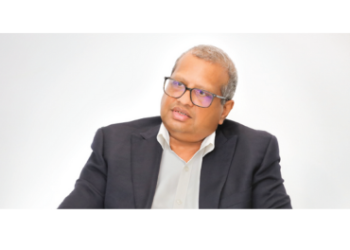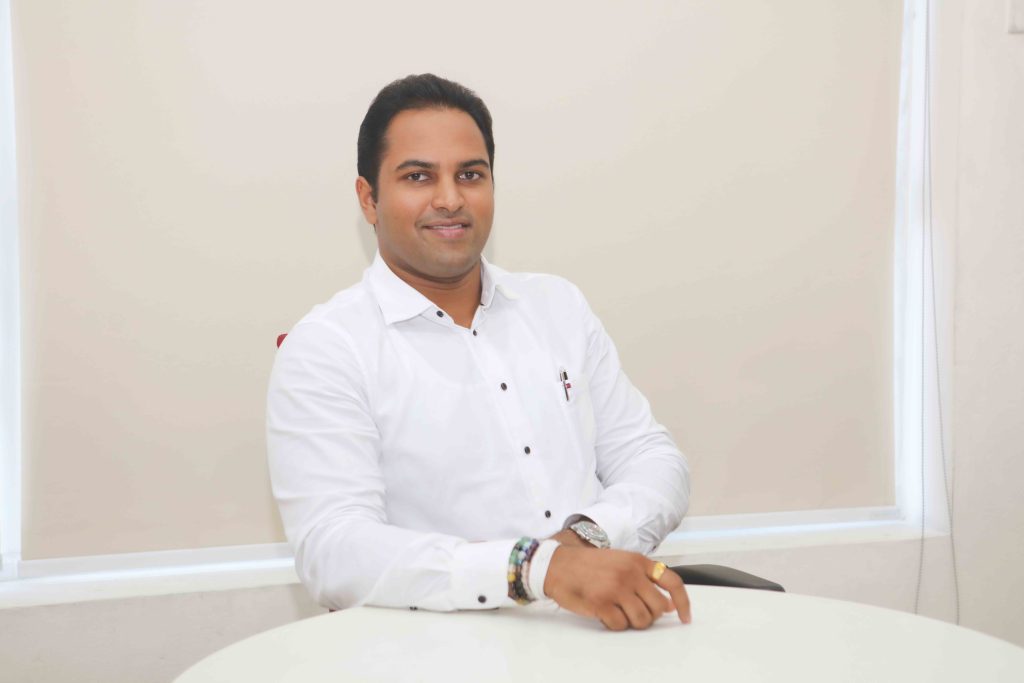
Hasith Gunasekara.
Hasith Gunasekara is the youngest candidate from the Samagi Jana Balawegaya (SJB). An alumnus of Sri Lanka’s transformative ‘Aragalaya’ movement, which played a pivotal role in toppling a sitting president, Hasith initially felt disillusioned by the country’s outdated and corrupt political landscape. However, inspired by the collective efforts of countless young activists demanding change, he has found renewed purpose. As he steps into mainstream politics, Hasith brings a fresh perspective and a commitment to differentiate himself from traditional politicians. He embodies the aspirations of the younger generation, who seek a transparent political culture and a brighter future for Sri Lanka. Speaking to Business Today, Hasith shares his vision as an emerging political leader and his ambitions for the nation’s future.
Words Jennifer Paldano Goonewardane.
Photography Sujith Heenatigala and Dinesh Fernando.
Tell us about your background and what motivated you to enter politics.
After completing my undergraduate studies at the University of Bath in the UK, I joined my family business, which focuses on power generation, and ventured into hospitality. This step was the right move after my education. However, as our country plunged into chaos and economic downturn, the Aragalaya movement emerged in response to people’s immense hardships. Like many others, I became actively involved in the Aragalaya because I desired a change in our political culture. In Sri Lanka, it’s common for political power to be passed down from parents to their children. My grandfather was a politician, but my father chose a business career and a simple lifestyle, avoiding the political scene he had witnessed firsthand.
Witnessing the devastating impact of family politics on our country, I felt compelled to act. The struggles of our people and the widespread disillusionment among the youth, including my peers from the UK, who are increasingly leaving the country, fueled my determination. Over 70 percent of my classmates from the UK have left Sri Lanka, disheartened by the current state of affairs. The brain drain, lack of job opportunities, and inadequate salaries are significant issues we cannot ignore.
Our country suffers from corrupt political practices that prioritize personal gain over national well-being. This corruption has led to a massive outflow of talent and a dire economic situation. In the past two years, more than 500,000 Sri Lankans have applied for passports to leave.
More young, educated individuals need to step into politics to change this corrupt political culture. My involvement in the Aragalaya served as a launch pad for my political aspirations. I am entering politics from the Gampaha district, where I reside, with a vision to transform Sri Lanka’s political landscape and create a sustainable future for our country.
Now that you spoke about our corrupt political culture, what drove the majority to vote against the old guard in the recent presidential election? But you are representing the SJB, whose members represent the old guard. Do you genuinely believe that new people who enter politics with the desire to change the culture will eventually deliver on the people’s desires?
The recent presidential election was a significant platform for the people to express their discontent and rejection of the entrenched political culture that has plagued Sri Lanka. This election saw a shift from the traditional two-party competition to the emergence of a third force, which I describe as an “anger vote” – a form of protest against the established political norms. President Anura Kumara Dissanayake’s rise to office reflects the people’s yearning for genuine change and frustration with the status quo.
Even many years after independence, the established political parties still need to address critical issues plaguing our country. They often resort to borrowed capital and increased taxes without exploring sustainable avenues such as leveraging our natural resources. This cycle of ineffective governance led to widespread dissatisfaction, culminating in the election of a third party as a clear message of discontent.
While I am part of the SJB, I am keenly aware of the need for genuine change within our ranks. I have been vocal about not accepting politicians with tarnished reputations into our party, addressing these concerns directly with our leader and during party meetings. In Gampaha, for instance, specific individuals with a history of corruption have attempted to join the SJB, but their past actions have significantly harmed their reputations. Their association with our party in the recently concluded presidential election resulted in a noticeable loss of votes, as the people of Gampaha rejected them overwhelmingly.
However, it’s important to note that the SJB has taken steps to distance itself from such individuals. My nomination as a young politician with no prior political background is a testament to our leader, Sajith Premadasa’s commitment to fostering new talent and promoting a fresh approach to politics. As the chief organizer of the Mahara electorate, an area we have yet to win since 1977, I am honored to have been given this opportunity to lead and contest.
Including younger, dedicated politicians like myself can drive the desired shift in our political culture. The SJB is committed to providing a platform for new voices and diverse perspectives. Working as a dynamic team, we can address the country’s current challenges and usher in a new political order prioritizing integrity, innovation, and sustainable development.
Our collective goal is to transform Sri Lanka’s political landscape, moving away from the corrupt practices of the past and towards a future where governance is transparent, accountable, and genuinely focused on the well-being of all citizens. Many young, educated individuals are ready to bring about meaningful change, and they share that aspiration and vision.
My involvement in the Aragalaya served as a launch pad for my political aspirations. I am entering politics from the Gampaha district, where I reside, with a vision to transform Sri Lanka’s political landscape and create a sustainable future for our country.
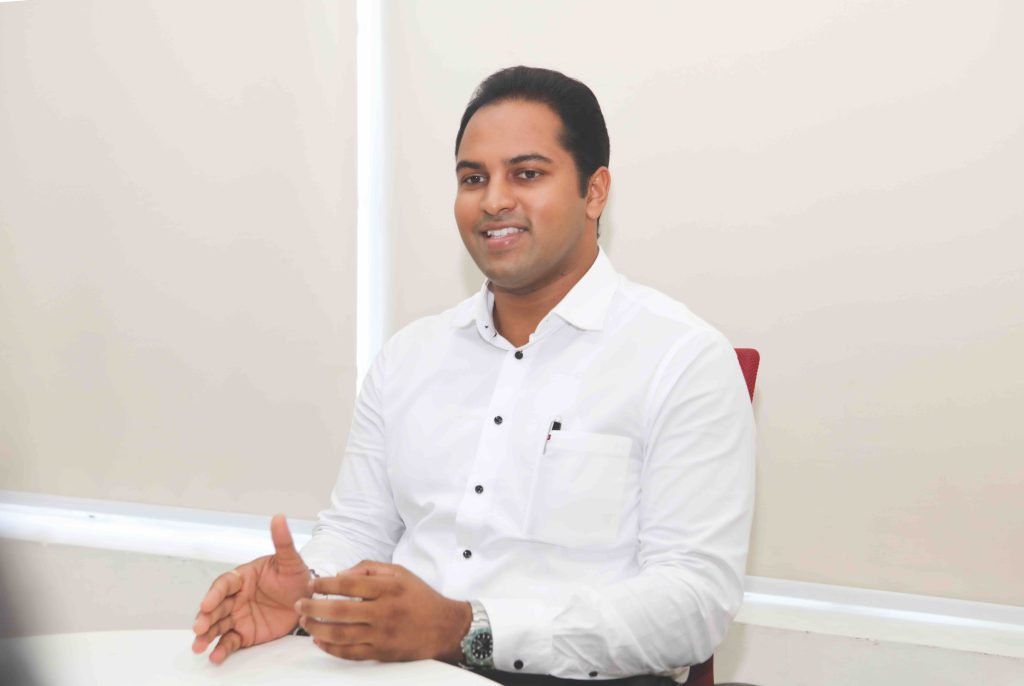
I believe in the power of collaboration, education, and systemic reform. By advocating for merit-based appointments, promoting local industries, leveraging our natural resources, ensuring transparency, and enacting appropriate legislation, we can address the critical issues facing the Gampaha district and replicate these solutions nationally.
Gampaha district had the most votes in the presidential election, making it significant for any politician. Given its dynamism, what opportunities do you see to serve?
I cannot overstate the Gampaha district’s significance in Sri Lankan politics, particularly given its large voter base. As a dynamic and populous area, it presents numerous opportunities for meaningful and impactful service.
One of the pressing issues in Gampaha is the recurrent flooding, which wreaks havoc on communities during the rainy season. Despite being represented by key politicians over the years, there has been a glaring need for long-term, sustainable solutions to this problem. The traditional response has been to visit affected areas, distribute food and groceries, and perform simple waterway clean-ups. This approach symbolizes the old political culture—temporary fixes rather than sustainable solutions.
As a young politician living in Gampaha, I know we need a more comprehensive approach to flood management. That includes dredging canals and waterways to improve water flow and reduce flooding. While we may not be able to eliminate flooding, we can certainly mitigate its impact significantly. Addressing this issue would be a priority for me, as it directly affects the lives and livelihoods of the district’s residents.
Another critical area needing attention is healthcare. In Gampaha, many hospitals struggle with basic supplies, particularly in remote areas. My Mahara electorate has hospitals where essential medicines like paracetamol are unavailable during emergencies. That is unacceptable. Having previously worked with hospitals as a youth, I see a significant opportunity for young politicians to make a difference. By improving healthcare infrastructure and ensuring that essential medicines and services are available, we can drastically improve the quality of life for our constituents.
Moreover, Gampaha has immense potential in entrepreneurship and the SME sector. Despite the district’s talent and natural resources, previous politicians failed to meet their needs and potential. Instead, they have fostered a culture of dependency by distributing freebies in exchange for votes. I reject this approach. I am committed to empowering entrepreneurs and small businesses, providing them with the support and resources they need to thrive and contribute to the local economy.
My vision is to shift away from traditional politics’ transient, vote-baiting tactics. By addressing the people’s genuine concerns and providing permanent solutions, I believe we can foster a culture of trust and mutual respect between politicians and constituents. When you deliver actual results, people naturally gravitate towards you—they recognize and appreciate genuine effort and practical solutions.
The opportunities to serve Gampaha are vast. By tackling issues like flooding with sustainable measures, improving healthcare access, and empowering the entrepreneurial spirit of the district, I aim to transform Gampaha into a model of effective governance and development. It is not just about winning elections; it’s about making a lasting, positive impact on the lives of the people I represent.
You have spoken about severe issues in the district. As only one representative, how do you plan to address them nationally?
Addressing the critical issues in the Gampaha district on a national level requires a multifaceted approach grounded in collaboration, education, and systemic reform. While I may be one representative, I believe that we can initiate meaningful change through strategic planning, leveraging existing resources, and advocating for policy changes.
Firstly, the issue of ministry allocations is paramount. We have witnessed unsuitable individuals receiving key ministries, resulting in ineffective governance. To address this, we must advocate for a merit-based system where ministries are allocated based on knowledge and educational background. That can ensure those in charge understand their roles in tackling the issues. As an elected representative, I will push for policies prioritizing qualifications and experience over political favoritism in ministerial appointments.
One of my national strategies involves promoting local medicine manufacturing. Despite being rich in natural resources, Sri Lanka imports many medicines. We can reduce costs, create jobs, and ensure affordability by fostering local pharmaceutical industries. That requires collaboration with experts, infrastructure investment, and policy support to facilitate local production. I will work to build alliances with professionals and stakeholders to draft and advocate for these necessary policy changes.
Furthermore, leveraging our land and natural resources can drive economic growth and employment. We need to develop sustainable industries that utilize these resources efficiently. That includes pharmaceuticals and other sectors like agriculture, renewable energy, and manufacturing. By creating a conducive environment for investment and innovation, we can harness our natural wealth for national development.
We have many talented doctors and professionals in the health sector. However, their potential is often stifled by political interference. We must create a system where merit and talent are recognized and utilized. That means ensuring that decisions in the health sector are made transparently and based on expertise, not political connections. I will advocate for policies that protect the autonomy of healthcare professionals and promote a meritocratic system.
Transparency and digitization are crucial in combating corruption and ensuring efficient governance. Implementing digital systems for public services can minimize human errors and reduce opportunities for corrupt practices. For instance, digitizing the tendering process for public projects can enhance transparency and accountability. I will work towards introducing and supporting legislation that mandates the digitization of government processes to ensure transparency and efficiency.
Finally, appropriate legislation is essential to drive these changes. We need laws that promote transparency, meritocracy, and accountability across all sectors. I will collaborate with like-minded legislators to draft and support bills that address these issues, ensuring they are discussed and enacted.
So, while I am one representative, I believe in the power of collaboration, education, and systemic reform. By advocating for merit-based appointments, promoting local industries, leveraging our natural resources, ensuring transparency, and enacting appropriate legislation, we can address the critical issues facing the Gampaha district and replicate these solutions nationally. My commitment is to work tirelessly to bring about these changes, ensuring a better future for Sri Lanka.
As a young politician, you must be meeting with many young people. What are their aspirations and sentiments about what is happening in the country? What have the youth told you?
When I speak with young people, I notice a mix of confusion and strong opinions about the current state of our country. Many young people express frustration, primarily because they feel disconnected from the political process. They often focus on slogans and rhetoric rather than assessing a leader’s capabilities. That highlights a broader issue in our education system, which fails to instill critical thinking and goal-setting skills.
Many young people need to evaluate political trends critically. For example, during the last presidential election, many were swayed by promises to end corruption and recover stolen funds, not realizing the complexities involved. That underscores the need for an education system that fosters maturity and independent thinking.
Young people often aspire to traditional professions like medicine, law, and engineering without considering if these roles align with their abilities and interests. We must reform our education system to help them identify their strengths and explore diverse career paths that suit their talents. This change can start with a more focused and relevant educational approach.
There is also a significant gap between the job market and young people’s skills. While businesses struggle to find qualified candidates, youth complain about a lack of job opportunities. This disconnect points to a need for better career guidance and training from an early age. Additionally, young people often lack focus and bring personal issues into the workplace, which hampers their performance. Addressing these issues can lead to a more competent and goal-oriented workforce.
Another concern is high employee turnover among young people in corporate settings. This can be attributed to a lack of early career focus and training. We need to teach young people to set goals and work diligently towards them, which will help them develop better values and job satisfaction.
Drug addiction is a significant issue in areas like the Gampaha district. Many young people, feeling disillusioned and unsupported, turn to drugs. Addressing the root causes of this problem, such as political corruption and inadequate law enforcement, is crucial.
The sentiments and aspirations of young people reveal a need for systemic change. By reforming our education system and addressing socio-political issues, we can empower the youth to build a better future for themselves and the country.
So, you represent a new breed of politicians. If you get elected to parliament, what sort of culture do you want to promote in the future?
As a young politician who does not fit the traditional mold in Sri Lanka, I aim to support and uphold what is right, regardless of party lines. For instance, if President Anura Kumara Dissanayake makes sound decisions, I will back him wholeheartedly. Similarly, I have admired how Sajith Premadasa, as the opposition leader, has used his platform over the last three years. Instead of merely criticizing the government, he initiated meaningful programs like the Sakwala project, which provided smart classrooms to schools after the COVID-19 pandemic—initiatives that should typically be government-led. He also secured essential medicine donations during the pandemic and supported the government on critical issues.
If elected to parliament, I will always stand for what is right and will not hesitate to speak out against wrongdoing, even if it risks my position. Politicians often perpetuate dependency by keeping people needy and poor. While I recognize the necessity of providing benefits to vulnerable groups, such as senior citizens, there should be other priorities besides this. Instead, we should aim to build a strong economy with ample job opportunities and a thriving environment for entrepreneurs.
Changing the culture from one of dependency to one of self-sufficiency requires significant effort. Politicians must move beyond mere appearances at funerals, weddings, and other functions to garner support. If they had effectively fulfilled their duties, people wouldn’t need to exchange their votes for freebies. The current culture of dependency has created a gap between politicians and the people, limiting constituents’ access to their representatives. My vision is to bridge this gap, ensuring that once elected, I remain accessible and responsive to the needs and grievances of my constituents.
What would be the solution to changing this culture?
Establishing a robust national policy is the solution to changing Sri Lanka’s current political culture. That is long overdue and has been discussed extensively but never implemented. A national policy is essential for the country’s future development because it would serve as a consistent guide, regardless of which political party is in power.
Sri Lanka’s economic downfall underscores the need for such a policy. Had a national policy been in place, we could have avoided the crisis that stemmed from shortsighted decisions. When we are doubtful of a leader’s skills and the impact of their decisions, a national policy provides a safeguard, ensuring continuity and stability in the public sector irrespective of leadership changes.
By implementing a national policy, we can put the country’s development back on track and protect the 22 million citizens from the consequences of irresponsible decision-making. The demand for a national policy is not just my belief but reflects the people’s desires. The recent outcry against the 225 members of parliament shows an apparent demand for responsible and capable representation.
Having a national policy is crucial for Sri Lanka’s progress. It is high time we implemented one to prevent the detrimental effects of shortsighted leadership. This new political reality is what young people in Sri Lanka are advocating for—a secure future ensured by a consistent and well-thought-out national policy. As a young politician, I am committed to advocating for this change and will be the first to support and promote the establishment of a national policy.
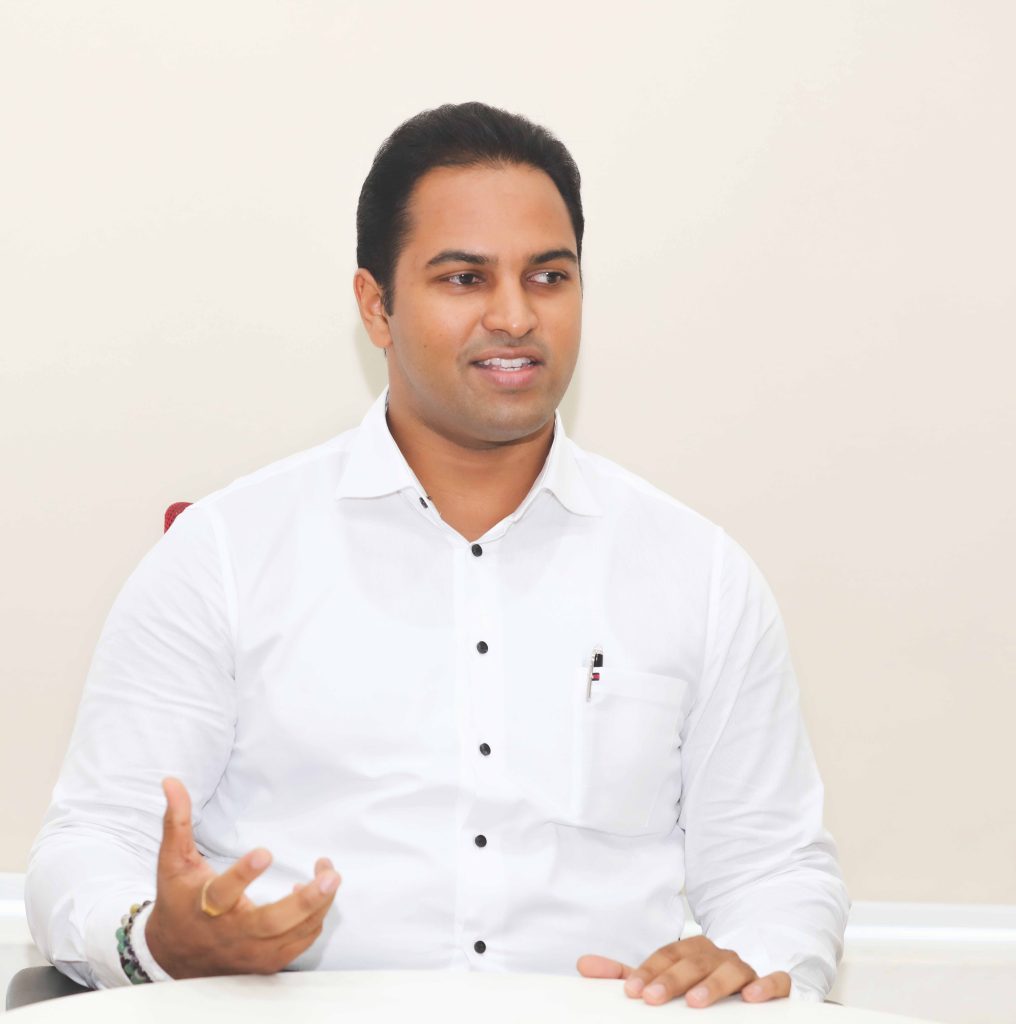
What is your opinion on the impact of geopolitical compulsions on Sri Lanka’s development?
Neutrality is the best stance for Sri Lanka. History has shown that countries aligning too closely with a single powerful nation often encounter significant problems. For example, when the Maldives adopted a pro-China policy and abandoned its longstanding ties with India, it led to complications. Given Sri Lanka’s strategic location, it has always been at the center of geopolitical dynamics. A neutral policy allows us to maintain cordial relations with multiple countries, thus avoiding conflicts.
A balanced approach enables Sri Lanka to benefit from its advantageous position. We must strategically leverage our location to generate revenue. That involves fostering trade collaborations rather than military alliances, which often provoke tension and protests from rival countries. Our abundant natural resources present another opportunity for collaboration and revenue generation.
Effective management of our relationships with powerful nations is crucial. We have seen the consequences of hosting military vessels from rival nations, which can lead to diplomatic strain. Therefore, focusing on trade and economic collaborations is more beneficial. These processes must be transparent to ensure Sri Lanka maximizes the benefits without compromising national security and sovereignty.
Sri Lanka faces the significant challenge of repaying its sovereign debt, suspended until 2028, with repayment scheduled from 2028 to 2042. By maintaining neutrality and strategically exploiting our location and resources, we can generate the revenue needed for future growth. It is time to shift from using foreign relations to secure loans, which have led to our debt crisis, to creating sustainable revenue streams. Lessons learned from the past must guide us toward a more stable and prosperous future. However, political maturity is vital to navigate the complexities of international relations.
So, as a young politician, what are your ambitions for the future?
If you had asked me this question two years ago, I would have expressed a very negative view of politics in Sri Lanka. I would have said that all politicians are corrupt and that politics is not for me. However, my perspective has changed significantly since then. My ambition is not for personal gain but for the betterment of my country.
The Aragalaya movement was a turning point, signaling a demand for change from the youth of this country. I want Sri Lankans to live in peace and prosperity, free from the crises that have plagued us. That is why I joined Sajith Premadasa and the Samagi Jana Balawegaya. SJB has the best combination of individuals from diverse fields, and I see no other party with such a promising team. We have refused nominations for individuals with questionable records because we need the right people to lead our country out of its current economic crisis.
Most Sri Lankans seek justice for past corruption and hope for the return of stolen assets. The authorities must serve justice. However, our most urgent task is implementing economic reforms to stabilize the economy. Sajith Premadasa and the SJB have the vision to bring about the necessary reforms and stability Sri Lanka desperately needs.
I entered politics because of my love for my country. I plan to live here and contribute to making Sri Lanka the peaceful and prosperous nation we all envision. I aim to help create a better future for all Sri Lankans and ensure that our nation recovers and thrives.
How are you conducting your campaign differently in the district if you want change?
As one of the youngest candidates, I have deliberately chosen not to align myself with any of the old politicians in the district. While I received many invitations to join their campaigns, I declined because associating with them would compromise my identity and make me appear as just another extension of traditional politics. My political views are distinct and represent a break from the past, which people are tired of.
I am campaigning independently with the people’s support, promoting my unique approach to politics. While I am part of the same party and work towards ensuring victory for the SJB, my campaign is self-directed. That is because I am committed to fostering a genuine shift in the country’s political culture.
The demand for new faces is loud and clear, as evidenced by the public’s call for the 225 members of parliament to step down. However, the country also needs experienced politicians who have been honest and practical. The SJB has a potent mix of new and seasoned candidates, each with diverse experiences and a solid track record. This combination of fresh perspectives and proven integrity is essential. New candidates bring innovative ideas and a desire to break away from traditional politics, while experienced politicians provide stability and knowledge. Together, we can create a well-rounded and effective leadership team that works for the betterment of Sri Lanka.
